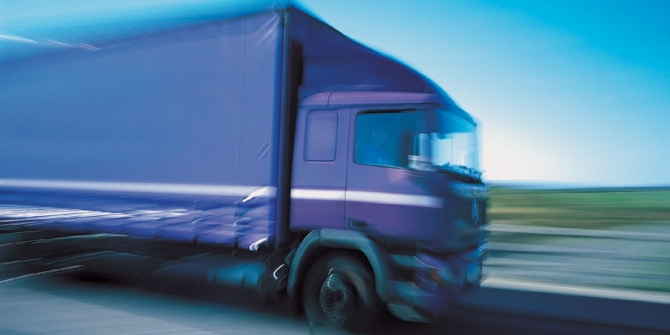When it comes to e-commerce, the UK has its foot on the accelerator. The average British consumer now spends £1,174 online every year,i while total Internet sales are racing towards £52.25 billion in 2015.ii Yet, while the juggernaut of digital growth bodes well for the economy, it also means many more hauliers are needed to transport and deliver the goods we order online.
The Freight Transport Association estimates 45,000 new heavy goods vehicle (HGV) drivers will be required to keep the country from grinding to a halt in the coming years.iii Moreover, this is only one aspect of the bigger picture: whether drivers are carrying consumer goods, passengers or industrial materials, an efficient transport, logistics and distribution industry is crucial to keeping Britain’s economy moving.
Warning signs
As economic imperatives put more professional drivers on Britain’s roads, safety cannot be forgotten. Employers have a legal obligation to safeguard their workers and the right precautions are critical to protect both employees and the public.
With UK drivers now travelling across Europe and beyond on a regular basis, employees face long periods spent working alone, in a high-risk environment where dangers like traffic accidents and physical attacks are pervasive.
In 2014 there were 1775 fatalities on the UK’s roads,iv with HGVs implicated in more than half of fatal motorway accidents.v Meanwhile, recent events in Calais have shown the growing potential for physical violence against hauliers – something also highlighted by the International Road Transport Union’s discovery that one in six HGV drivers has been attacked in recent years.vi Even when vehicles are stationery, risks still exist: handling incidents during collections and deliveries make up a significant part of the 70 deaths and 2000 serious injuries involving vehicles in and around workplaces each year.vii
Meanwhile a complex array of other factors can create additional risks for professional drivers working alone - from operating late at night, to using heavy machinery, carrying dangerous loads, or braving extreme weather conditions.
The road to safety
While taking steps to ensure driver safety is a moral and legal obligation, there are also significant financial reasons for employers to act. Incidents can delay, damage or destroy both valuable vehicles and their loads, as well as exposing employers to regulatory fines, legal fees and the cost of supporting injured workers. Fortunately, there are simple and cost-effective steps every business can take to minimise or avoid occupational road risks.
Providing drivers with straightforward safety checklists can help them confirm that reasonable precautions have been taken before they set off, while education and training can also better prepare them to cope with any emergencies in the field.
With processes that make it simple to report accidents or near misses and preserve supervisor findings for future audit and review, operational policies can also be continuously refined to improve safety. For example, a carrier could decide to shrink-wrap pallets rather than sheet whole loads for weather protection. Not only does this remove the need for employees to clamber onto vehicles and risk a fall, it also reduces the potential for accidents due to high winds and better protects products, reducing returns due to spoilage.
Given that more than 13,000 HGV driversviii are now aged 65 or over, employers should also be able to see and respond to medical emergencies quickly, even if the driver is incapacitated. Automated solutions can help. For instance, if a driver slips on ice while unloading goods, LONEALERT’s Man Down Alarm detects the fall, audibly warns the user and then raises an alert if there’s no response.
The ability to locate drivers instantly, anytime and anywhere, is another huge boon to safety. Fortunately, smartphones make tracking employees easy and cost-effective. While drivers should never use mobile phones at the wheel, LONEALERT’s smartphone app enables automatic GPS tracking in or out of the vehicle. Similarly, our Check-Call Service enables regular communication with drivers, who can pull over and use any phone to set up automated check-ins during times of increased risk, or raise the alarm in an emergency.
As the transport industry continues to accelerate the UK’s economic recovery, the drive for commercial success can go hand-in-hand with better protecting employees. Following the steps above will build a safer and more profitable industry that really does deliver.
- Econsultancy, UK online retail sales to reach £52.25bn in 2015: report, 2015: https://econsultancy.com/blog/66007-uk-online-retail-sales-to-reach-52-25bn-in-2015-report/
- Econsultancy, UK online retail sales to reach £52.25bn in 2015: report, 2015: https://econsultancy.com/blog/66007-uk-online-retail-sales-to-reach-52-25bn-in-2015-report/
- BBC News, Lorry driving: The logistics of keeping logistics on the road, 2015: http://www.bbc.co.uk/news/uk-england-tyne-30496851
- UK Government, Reported road casualties in Great Britain: main results 2014, 2015: https://www.gov.uk/government/statistics/reported-road-casualties-in-great-britain-main-results-2014
- Campaign for better transport, Lorries involved in rising percentage of fatal crashes, 2013: http://www.bettertransport.org.uk/media/21-10-2013-lorry-fatalities-research
- International Road Transport Union. Organised crime, 2015: https://www.iru.org/
- HSE, Delivering safely, 2015: http://www.hse.gov.uk/workplacetransport/information/cooperation.htm
- BBC News, Lorry driving: The logistics of keeping logistics on the road, 2015: http://www.bbc.co.uk/news/uk-england-tyne-30496851

